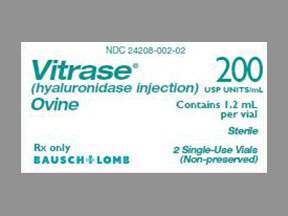
Vitrase Coupons & Savings Card – Discount Prices from $106.43
My prescription
Edit
2 solutions 1.2ML of 200UNIT/ML, Vitrase (1 Vial)
Select pharmacy

CVS
$140.73
COUPON PRICE
Walmart
$106.43
COUPON PRICE
Walgreens
$117.42
COUPON PRICE
Albertsons
$132.19
COUPON PRICEVitrase savings card
Show this card to your pharmacist
Walmart
$106.43
BIN
ID
PCN
GRP
019876
LH06B57C0E
CHIPPO
LHX
Powered by
Price history for Vitrase
1 Vial, 1.2ML of 200UNIT/ML
Average retail price for Vitrase
Average SaveHealth price for Vitrase
Our price history data is based on aggregated prescription data collected from participating pharmacies in America. Our prescription data updates daily to reflect the latest price changes. If you notice a missing data point, it means there wasn't sufficient data available to generate a monetary value for that date.
*Retail prices are based on pharmacy claims data, and may not be accurate when we don't have enough claims.
Vitrase dosage forms
Dosage Quantity Price from Per unit 1.2ML of 200UNIT/ML 1 Vial $106.43 $106.43 1.2ML of 200UNIT/ML 2 Vials $231.84 $115.92 1.2ML of 200UNIT/ML 3 Vials $357.26 $119.09
| Dosage | Quantity | Price from | Per unit |
|---|---|---|---|
| 1.2ML of 200UNIT/ML | 1 Vial | $106.43 | $106.43 |
| 1.2ML of 200UNIT/ML | 2 Vials | $231.84 | $115.92 |
| 1.2ML of 200UNIT/ML | 3 Vials | $357.26 | $119.09 |
What is vitrase used for?
Vitrase is used as an adjuvant to increase the absorption and dispersion of other injected drugs. It is also used to facilitate the absorption of subcutaneous fluids and to improve the resorption of radiopaque agents in subcutaneous urography. Additionally, it can be used to manage extravasation of certain medications.
Is vitrase discontinued?
Vitrase has not been discontinued. It is still available and used in medical settings.
Is vitrase the same as hyaluronidase?
Yes, Vitrase is a brand name for a formulation of hyaluronidase. Hyaluronidase is an enzyme used to break down hyaluronic acid, which can help in the dispersion and absorption of other injected drugs.
How much does Vitrase cost?
The cost of Vitrase can vary depending on the pharmacy, location, and whether the patient has insurance coverage. It is recommended to check with local pharmacies or healthcare providers for the most accurate and up-to-date pricing information. Additionally, some pharmaceutical companies may offer patient assistance programs to help reduce the cost for eligible individuals.
Is vitrase FDA approved?
Yes, Vitrase is FDA approved. It is used as a spreading agent to enhance the dispersion and absorption of other injected drugs.
